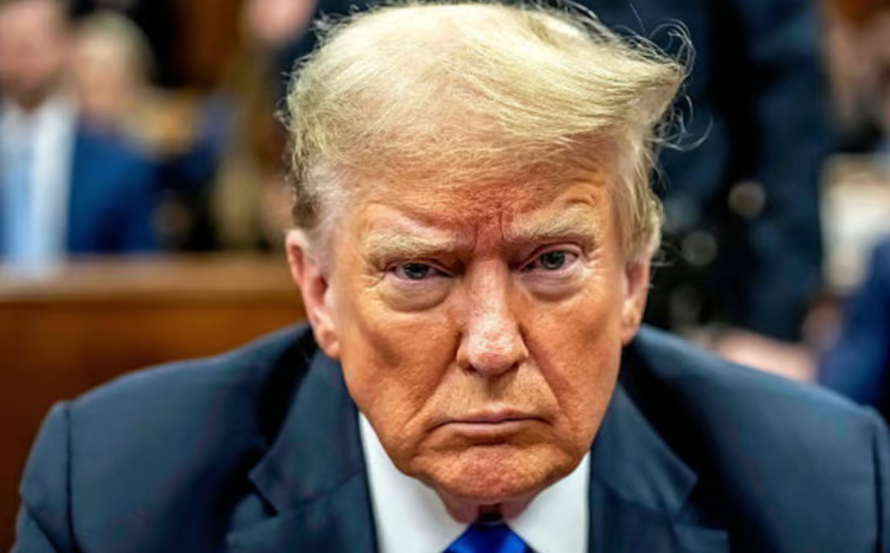Gossip
Donald Trump tries to get his felony charges dismissed

Our daily political update, featuring the stories that matter
Donald Trump’s lawyers asked the judge overseeing his hush-money case in New York, in which he was convicted of 34 felonies, to dismiss the charges against him. Mr Trump’s legal team pointed to Joe Biden’s pardon of his son, Hunter, arguing that the president’s decision was “an extraordinary condemnation” of his own justice department. Mr Biden said that his son’s prosecution was politically motivated and “led to a miscarriage of justice”. Mr Trump’s lawyers also argued that the prosecutor who charged him was participating in “political theatre”. After Mr Trump’s re-election to the presidency the judge indefinitely delayed his sentencing.
Mr Trump discussed replacing Pete Hegseth, whom he has named to run the Pentagon, with Ron DeSantis, Florida’s governor, according to the Wall Street Journal. The former national guardsman and Fox News host has faced allegations of sexual misconduct, which he denies. Republican lawmakers have also soured on Mr Hegseth; Lindsey Graham, a senator, called allegations against him “very disturbing”. Mr Hegseth would be the second of Mr Trump’s picks to be ditched since November, after Matt Gaetz, his first choice for attorney-general.
After weeks of delay, Mr Trump’s transition team signed an agreement with the justice department allowing the FBI to perform background checks on the people he has picked for his incoming administration. Such vetting is standard; senators typically review the findings when they vote on nominees. Advisers to the president-elect, who believes the FBI is biased against him, had floated the idea of using a private security firm instead.
The divisive question of gender transitioning for adolescents arrives at the Supreme Court on Wednesday. In United States v Skrmetti the justices will examine whether Tennessee’s ban on puberty blockers and hormone treatments for minors diagnosed with gender dysphoria is an example of discrimination that violates the 14th Amendment’s equal-protection clause. Their decision, expected in the spring, will affect similar laws in 23 other states.
Jared Moskowitz, a congressman from Florida, became the first Democrat to join a caucus supporting the Department of Government Efficiency. Mr Trump chose Elon Musk and Vivek Ramaswamy to lead the cost-cutting advisory body last month. Mr Moskowitz, who has previously joined (separate) caucuses for UFO-curious lawmakers and dog lovers, said he believed that “reducing ineffective government spending should not be a partisan issue”.
Correction: In yesterday’s edition we said that the Democrats will soon lose their majority in the House of Representatives. They are, of course, already in the minority. Sorry.
Your tariff questions, answered
Since becoming president-elect Donald Trump has repeated his threats to impose tariffs on goods that America imports. Many of you wrote in with questions about his approach to trade. Simon Rabinovitch, our US economics editor, answered some of them. Questions have been lightly edited for clarity.
I am a college student. Any intro economics class will teach that limiting trade leads to higher prices for all parties. So what are Donald Trump’s motives for making goods more expensive, and should we be worried about inflation?
Donald Trump would disagree with that textbook description of tariffs. His argument is that foreign countries pay for them (though the evidence from his first term is that their cost was almost fully borne by Americans). His overarching motive is to spur a renaissance in American manufacturing. For him, raising the prices of foreign-made goods is a feature, not a bug. He believes that doing so helps to protect companies already operating in America and that, if set high enough, tariffs also encourage foreign companies to build factories in America, as a way around the levies. One thing that critics overstate is the inflationary threat: tariffs raise the prices of imports but eventually weigh on other prices—including, notably, wages—such that they do little to feed into overall inflation.
What are the upsides and downsides of tariffs, and how could they be used effectively? Are they meaningfully different from taxes (which are certainly less appealing)?
Tariffs do offer protection to domestic producers by raising their foreign competitors’ prices. And there is a case for targeted levies to give infant industries a chance; that, however, is more justifiable for a developing country. In a wealthy, diverse economy such as America, tariffs do more harm than good. For example, steel tariffs in Mr Trump’s first term helped the steel industry but raised costs for many others that use steel, and ultimately led to a net loss in manufacturing jobs. Tariffs are a sales tax on imports, and they are a lousy tax at that: they do not raise much revenue, they make the economy less competitive and they are most costly for people on lower incomes.
Are Donald Trump’s tariffs perhaps more of a negotiating tool than an actual plan for international trade policy?
The hope for many businesses and investors is indeed that Mr Trump wants to wrest concessions from other countries through the threat of tariffs, not actually implement them in full measure. Scott Bessent, the incoming treasury secretary, has described Mr Trump’s talk of a 60% tariff on Chinese goods as a “maximalist negotiating position”. The trouble with this view is that one of the few policies consistently pushed by Mr Trump over the past decade has been higher tariffs. He truly seems to think they work. And the direction of travel in his first term was one way: he raised tariffs multiple times and never reduced them. It may well take a stockmarket swoon to persuade Mr Trump that he had better hold off on his most extreme tariff plans.
Can you recommend any books to better understand Donald Trump’s use of tariffs, or even tariffs more generally?
“No Trade is Free”, by Robert Lighthizer, America’s trade representative in Mr Trump’s first term, for the Trumponomics perspective.
“Clashing Over Commerce”, by Douglas Irwin, for a readable history of American trade policy – and why, until Donald Trump, it left tariffs behind.
“How Asia Works”, by Joe Studwell, for an account of why, in specific contexts and for limited times, targeted tariffs can be useful.
A family affair
The Arab world is trying to understand the implications of Mr Trump’s decision to appoint Massad Boulos as an adviser on the Middle East. Read our profile of Mr Boulos, a Lebanese-American tycoon and the father-in-law of Mr Trump’s daughter Tiffany, who says the president-elect is Lebanon’s “last hope”.
A view from elsewhere
“The entire point of the American revolution was a rebellion against monarchy,” wrote the editorial board of the Sydney Morning Herald, an Australian newspaper. But America’s presidents “persist in proudly aping that most English of traditions, the royal pardon”. Mr Biden’s decision to pardon his son, Hunter, was “a broken promise and a craven pre-emptive move” ahead of the younger Mr Biden’s sentencing.
Figure of the day
83%, the share of Mexico’s goods exports that go to America. Nearly 80% of Canada’s goods exports go there, too. Read our story on Mr Trump’s threat to impose tariffs of 25% on imports from Mexico and Canada on his first day in office.
From Monday to Thursday we’ll quiz you on all things American. This week we’re asking about “lame-duck” periods.
Wednesday: On December 29th 1845 James Polk signed a bill annexing which soon-to-be state?
Tuesday: In 1992 George H.W. Bush pardoned six men involved in which Reagan-era scandal?
See how to take part in the quiz at the bottom of this page.
If you enjoyed this week’s questions, play Dateline, The Economist’s history game.




